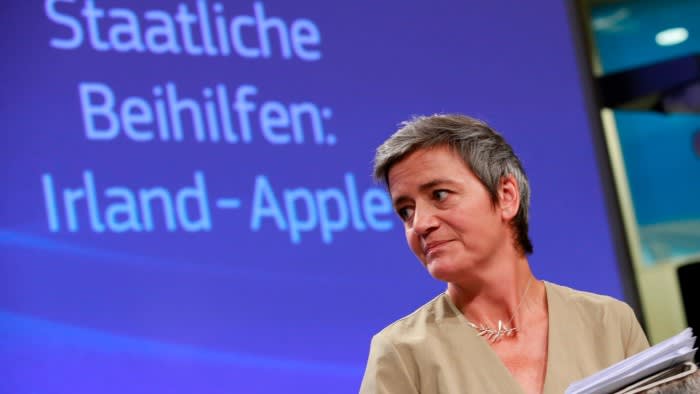Unlock the Editor’s Digest for free
Roula Khalaf, Editor of the FT, selects her favourite stories in this weekly newsletter.
Apple has suffered a significant defeat after the EU’s top court ruled that the iPhone maker must pay €13bn in back taxes, overturning an earlier decision in the Big Tech group’s favour.
The ruling relates to a 2016 case when the EU’s competition chief Margrethe Vestager said that Ireland had given the company an illegal sweetheart deal, amounting to a tax rate of less than 1 per cent.
The European Court of Justice said on Tuesday its ruling “confirms the European Commission’s 2016 decision: Ireland granted Apple unlawful aid which Ireland is required to recover”.
A lower court had in 2020 quashed the commission’s order and the ECJ’s decision to overturn that ruling was unexpectedly decisive.
Apple chief executive Tim Cook has previously dismissed the commission’s position as “total political crap”. On Tuesday the company said the EU was “trying to retroactively change the rules and ignore that, as required by international tax law, our income was already subject to taxes in the US”.
The case has been watched carefully across the bloc as a watershed moment over Big Tech’s tax affairs in Europe, with the EU’s efforts to probe the arrangements between companies and member states having previously suffered setbacks.
Last year, Amazon won a court battle over its tax arrangements in Luxembourg after the ECJ ruled that the commission could not force the large US e-retailer to pay €250mn in back taxes to Luxembourg. Brussels also lost a similar case over the Netherlands’ tax treatment of Starbucks but did not appeal against the ruling.
However, the ECJ on Tuesday affirmed the commission’s original finding that Apple’s tax structure in Ireland — which excluded the profits generated from the intellectual property licences held by its international and European arms — amounted to state aid.
Chiara Putaturo, Oxfam EU tax expert, said that while the Apple ruling “will force the tech giant to pay its debt, the root of the issue is far from solved. EU tax havens can still make sweetheart tax deals with big multinationals. The duty to stop this rests on the shoulders of EU policymakers.”
Separately on Tuesday, Brussels won a landmark antitrust case against Google after the ECJ ruled that the search giant abused its market power by ranking its shopping services over rivals — granting itself an illegal and unfair advantage. The court upheld a €2.4bn EU competition fine against Google in the case.
Google said: “We are disappointed with the decision of the court. This judgment relates to a very specific set of facts. We made changes back in 2017 to comply with the European Commission’s decision. Our approach has worked successfully for more than seven years, generating billions of clicks for more than 800 comparison shopping services.”
The pair of rulings represent victories for Vestager, the EU’s competition chief who is expected to depart the role this year. During her decade-long tenure, she has repeatedly taken on high-profile cases targeting the world’s biggest technology companies.


